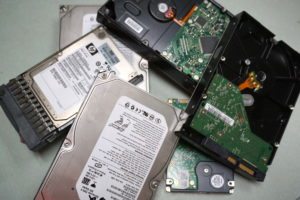 Every company and household generates e-waste in the form of obsolete computers, monitors, printers, and peripherals. In fact, according to the StEP Initiative (“Solving the E-Waste Problem”, a partnership created by the United Nations organizations, government, non-government and science organizations), over 54 million tons of used electrical and electronics products were disposed of in 2014. That is an average of approximately 43 lbs per person on Earth.
Every company and household generates e-waste in the form of obsolete computers, monitors, printers, and peripherals. In fact, according to the StEP Initiative (“Solving the E-Waste Problem”, a partnership created by the United Nations organizations, government, non-government and science organizations), over 54 million tons of used electrical and electronics products were disposed of in 2014. That is an average of approximately 43 lbs per person on Earth.
As electronics become increasingly “disposable”, this amount is expected to grow. By 2017 the StEp Initiative forecasts the world will produce about 33% more e-waste, or about 72 million tons.
Electronics Recycling: data and challenges
As of 2016, The US is behind in electronics waste recycling when compared with countries in the European Union. Most European Countries have had established recycling programs for electronics materials for more than 10 years, whereas in the US, only 29 today states have similar programs.
Obtaining numbers related to electronics waste recycling can be difficult, as some countries do not readily share such information, and rates are not properly or accurately reported.
There are also roadblocks with regard to recycling this type of material. The value for e-waste is variable. E-waste value is determined by the actual market or “resale” value of the components which make up any one product. Many components do not have resale value, and instead require significant expense to cover the “cost” of proper recycling.
Electronics Recycling: environmental toxins
A large quantity of e-waste is comprised of old computer monitors and TV’s. Glass from these products contain lead, and therefore cannot and should not be disposed of in landfills. This lead can leach into the surrounding environment, and has the potential to contaminate groundwater.
There have been many cases where large electronics recycling businesses have been shut down, or have gone bankrupt, only to find out they have warehouses filled with old computer monitors and TV’s. Being able to charge for the disposal of these electronics may have, at one time, helped finance these businesses’ operations. Unfortunately, when the opportunity is not taken advantage of because of a flawed business plan, it makes it necessary for someone else to subsidize the recycling.
Questions to ask when hiring an e-waste recycler for your company:
Be selective when choosing a company to handle your obsolete e-waste.
- What is your history of electronics recycling?
- What is your track record in the industry?
- Can you provide solid referrals?
If you hire an inexperienced electronics recycler or a recycling company that is willing to cut corners, you may be exposing the environment to toxins and running the risk of needing a third party to help you finish the job, if the company you choose falls through.
Miller Recycling has an extensive track record of properly disposing of e-waste. Please contact us to learn more or to discuss your electronics recycling needs.
